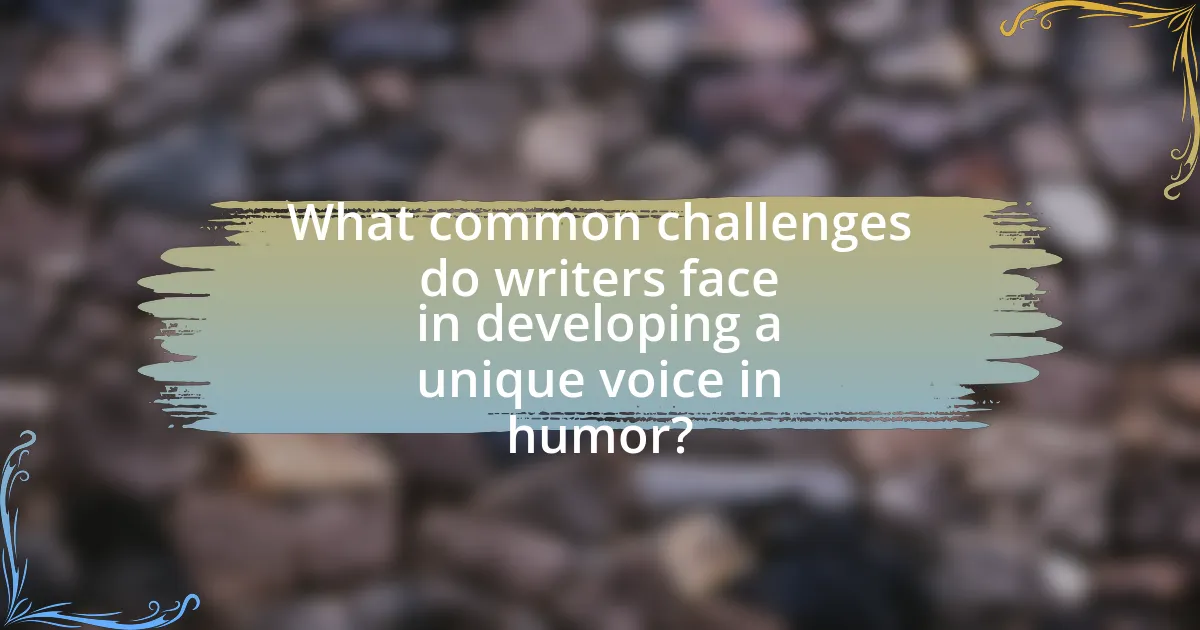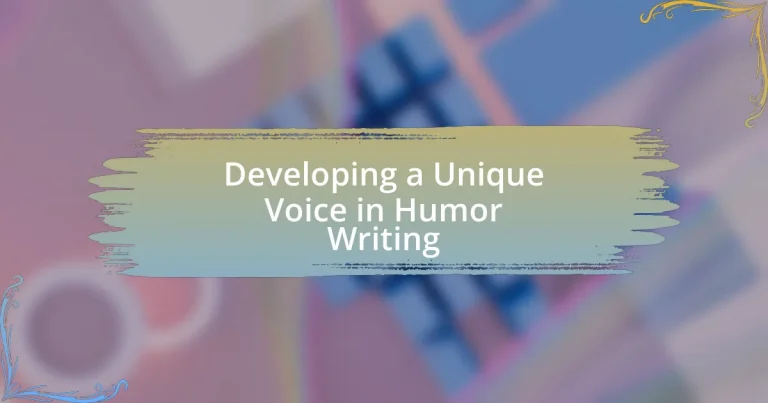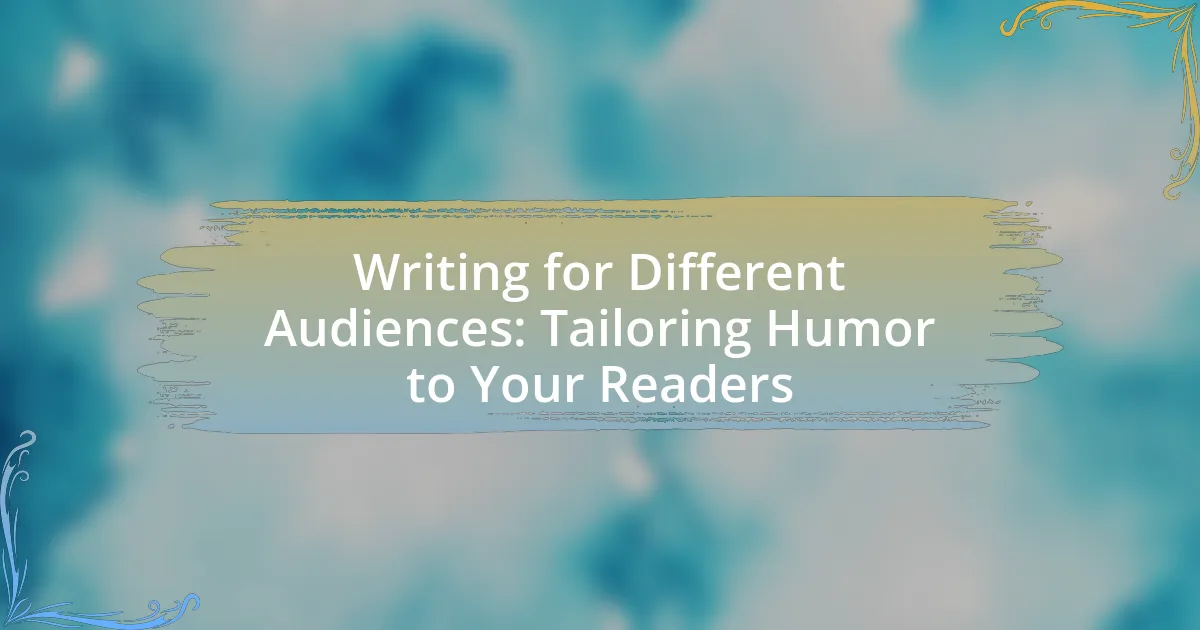The article focuses on developing a unique voice in humor writing, emphasizing the importance of distinct style and perspective that differentiates writers in the genre. It outlines methods for identifying personal humor styles, including analyzing influences, experimenting with techniques, and reflecting on personal experiences. Key elements contributing to a writer’s unique voice include language use, comedic perspective, and authenticity derived from personal narratives. The article also addresses common challenges writers face, such as originality and self-doubt, while providing practical tips for cultivating a distinctive voice through regular practice, feedback, and revision.

What does it mean to develop a unique voice in humor writing?
Developing a unique voice in humor writing means creating a distinct style and perspective that sets an author apart from others in the genre. This involves using specific language, tone, and comedic techniques that resonate with the writer’s personality and experiences. For instance, humorists like David Sedaris and Tina Fey are recognized for their unique voices, which blend personal anecdotes with sharp wit, making their work instantly recognizable. A unique voice enhances relatability and engagement, allowing readers to connect with the humor on a deeper level.
How can a writer identify their personal style in humor?
A writer can identify their personal style in humor by analyzing their influences, experimenting with different comedic techniques, and reflecting on their unique perspectives. By examining the works of comedians and humorists they admire, writers can discern the elements that resonate with them, such as timing, wordplay, or observational humor. Experimentation with various styles, such as satire, absurdity, or dark humor, allows writers to discover what feels most authentic. Additionally, reflecting on personal experiences and viewpoints can help writers infuse their humor with originality, making it distinctively theirs. This process is supported by the understanding that humor often stems from personal truth, as noted by humor theorists who emphasize the importance of authenticity in comedic expression.
What elements contribute to a writer’s unique voice in humor?
A writer’s unique voice in humor is shaped by elements such as personal experiences, distinct language use, and a specific comedic perspective. Personal experiences provide authenticity and relatability, allowing writers to draw from their own lives to create humor that resonates with audiences. Distinct language use, including word choice, rhythm, and sentence structure, contributes to a recognizable style that sets a writer apart. Additionally, a specific comedic perspective, whether it be observational, satirical, or absurdist, defines how humor is approached and delivered. These elements collectively create a signature voice that engages readers and enhances the effectiveness of the humor.
How does personal experience shape a humor writer’s voice?
Personal experience significantly shapes a humor writer’s voice by providing unique perspectives and relatable content. Writers draw from their own life events, cultural background, and emotional responses, which infuse authenticity into their humor. For instance, a humorist who has faced challenges may use those experiences to create comedic narratives that resonate with audiences, making their work more engaging. This connection is supported by studies indicating that humor often arises from shared experiences, allowing writers to craft jokes that reflect common human conditions, thus enhancing relatability and impact.
Why is a unique voice important in humor writing?
A unique voice is important in humor writing because it distinguishes the writer’s style and perspective, making the content more engaging and relatable to the audience. This distinctiveness allows humor to resonate on a personal level, enhancing the comedic effect. Research indicates that humor is often subjective, and a unique voice can bridge the gap between the writer’s intent and the audience’s reception, leading to a stronger connection. For instance, comedians like Jerry Seinfeld and Ellen DeGeneres have built their careers on their unique comedic voices, which reflect their personalities and experiences, making their humor more impactful and memorable.
What impact does a unique voice have on audience engagement?
A unique voice significantly enhances audience engagement by creating a distinct and relatable connection between the writer and the audience. This connection fosters a sense of authenticity, making the content more memorable and enjoyable. Research indicates that when humor writing incorporates a unique voice, it resonates more with readers, leading to increased sharing and interaction. For instance, a study published in the Journal of Personality and Social Psychology found that individuals are more likely to engage with content that reflects a personal and unique style, as it aligns with their preferences for authenticity and relatability.
How does a distinct voice differentiate a writer in a crowded market?
A distinct voice differentiates a writer in a crowded market by creating a unique identity that resonates with readers. This individuality allows the writer to stand out among numerous competitors, as it reflects personal style, perspective, and tone. For instance, humor writers like David Sedaris and Tina Fey have established recognizable voices that engage audiences, making their work memorable and sought after. Research indicates that readers are more likely to connect with content that feels authentic and relatable, which a distinct voice provides. This connection fosters loyalty and encourages word-of-mouth promotion, further enhancing the writer’s visibility in a saturated market.

What techniques can be used to cultivate a unique voice in humor writing?
To cultivate a unique voice in humor writing, writers can employ techniques such as personal storytelling, observational humor, and wordplay. Personal storytelling allows writers to infuse their experiences and perspectives, making their humor relatable and distinctive. Observational humor focuses on everyday situations, enabling writers to highlight the absurdities of life, which resonates with audiences. Wordplay, including puns and clever language twists, adds a playful element that can set a writer apart. These techniques are supported by the fact that humor often thrives on originality and authenticity, as seen in successful comedians and humorists who leverage their unique backgrounds and viewpoints to engage their audiences effectively.
How can writers experiment with different styles and tones?
Writers can experiment with different styles and tones by actively engaging in diverse writing exercises and analyzing various literary works. By practicing techniques such as imitating the styles of established authors or incorporating elements from different genres, writers can discover new ways to express their voice. For instance, humor writers can explore satire, absurdism, or observational humor to see how each style affects the tone and reception of their work. Research indicates that exposure to a wide range of writing styles enhances creativity and adaptability, allowing writers to refine their unique voice effectively.
What are some exercises to help develop a unique humor style?
To develop a unique humor style, engage in exercises such as writing daily jokes, experimenting with different comedic formats, and analyzing the humor of various comedians. Writing daily jokes helps refine timing and punchlines, while experimenting with formats like stand-up, sketch, or satire allows for exploration of different comedic voices. Analyzing humor from comedians provides insight into diverse styles and techniques, enhancing one’s own approach. Research indicates that consistent practice and exposure to varied comedic influences significantly contribute to the development of a distinctive humor style.
How can feedback from peers enhance a writer’s voice?
Feedback from peers can enhance a writer’s voice by providing diverse perspectives that highlight strengths and areas for improvement. When writers receive constructive criticism, they can identify unique elements of their style that resonate with others, allowing them to refine and develop their voice further. Research indicates that peer feedback fosters a collaborative environment, which can lead to increased creativity and innovation in writing. For instance, a study published in the Journal of Writing Research found that writers who engaged in peer review reported greater confidence in their voice and style, demonstrating the positive impact of collaborative feedback on personal expression.
What role does reading play in developing a unique voice?
Reading plays a crucial role in developing a unique voice by exposing writers to diverse styles, tones, and perspectives. This exposure allows writers to identify what resonates with them and to experiment with different narrative techniques. For instance, analyzing the works of established humorists can help emerging writers understand timing, wordplay, and audience engagement, which are essential elements in humor writing. Studies have shown that reading widely enhances vocabulary and comprehension, enabling writers to articulate their thoughts more effectively and creatively. Consequently, this process fosters the development of a distinctive voice that reflects individual experiences and insights.
Which authors or comedians should writers study for inspiration?
Writers should study authors and comedians such as Mark Twain, Tina Fey, and David Sedaris for inspiration. Mark Twain is renowned for his sharp wit and social commentary, which can help writers understand the use of humor in storytelling. Tina Fey’s work, particularly in “Bossypants,” showcases the blend of personal narrative and humor, offering insights into crafting relatable comedic voices. David Sedaris is celebrated for his observational humor and storytelling style, providing examples of how to infuse personal experiences with comedic elements. These figures exemplify effective humor writing techniques that can inspire writers to develop their unique voice.
How can analyzing different humor styles contribute to voice development?
Analyzing different humor styles contributes to voice development by allowing writers to identify and refine their unique comedic voice. By studying various humor styles, such as observational, satirical, or absurdist, writers can discern which elements resonate with their personal experiences and audience preferences. This understanding enables them to experiment with tone, timing, and delivery, ultimately enhancing their comedic effectiveness. Research indicates that exposure to diverse humor styles can improve a writer’s adaptability and creativity, fostering a distinctive voice that stands out in humor writing.

What common challenges do writers face in developing a unique voice in humor?
Writers commonly face challenges such as finding originality, balancing personal style with audience expectations, and overcoming self-doubt when developing a unique voice in humor. Originality is crucial because humor often relies on fresh perspectives; however, many writers struggle to differentiate their voice from existing comedic styles. Balancing personal style with audience expectations is essential, as humor must resonate with readers while still reflecting the writer’s individuality. Additionally, self-doubt can hinder a writer’s confidence in their comedic voice, leading to hesitation in expressing their unique perspective. These challenges are well-documented in studies on humor writing, which emphasize the importance of authenticity and audience connection in comedic success.
How can self-doubt affect a writer’s voice in humor writing?
Self-doubt can significantly undermine a writer’s voice in humor writing by causing hesitation and inconsistency in their comedic expression. When writers experience self-doubt, they may second-guess their jokes, leading to a lack of authenticity and spontaneity, which are crucial for effective humor. Research indicates that humor relies on confidence; for instance, a study published in the Journal of Personality and Social Psychology found that individuals who exhibit higher self-esteem are more likely to engage in humorous interactions. Consequently, self-doubt can result in a more cautious and less engaging voice, ultimately diminishing the impact of the humor.
What strategies can writers use to overcome self-doubt?
Writers can overcome self-doubt by implementing strategies such as setting realistic goals, seeking feedback, and practicing self-compassion. Setting realistic goals helps writers break down their work into manageable tasks, reducing feelings of overwhelm and allowing for incremental progress. Seeking feedback from trusted peers or mentors provides external validation and constructive criticism, which can bolster confidence and improve writing skills. Practicing self-compassion involves treating oneself with kindness and understanding during moments of doubt, which has been shown to enhance resilience and motivation in creative endeavors. Research indicates that self-compassion can lead to greater emotional well-being and improved performance in creative tasks, making it a valuable strategy for writers facing self-doubt.
How can writers avoid imitating others while finding their voice?
Writers can avoid imitating others while finding their voice by engaging in self-reflection and experimenting with different styles. Self-reflection allows writers to identify their unique perspectives and experiences, which can inform their voice. Experimenting with various writing techniques, genres, and tones helps writers discover what resonates with them personally. Research indicates that writers who practice free writing and journaling often develop a more authentic voice, as these methods encourage spontaneity and personal expression. By focusing on their individual thoughts and feelings, writers can cultivate a distinctive style that sets them apart from others.
What are the pitfalls of trying to please all audiences?
The pitfalls of trying to please all audiences include diluting one’s unique voice and alienating core supporters. When a humor writer attempts to cater to everyone, the result often leads to generic content that lacks authenticity, making it less engaging. Research indicates that niche audiences tend to respond more positively to specific styles and themes, as seen in the success of comedians like Dave Chappelle and Hannah Gadsby, who maintain distinct voices that resonate deeply with their target demographics. Additionally, striving for universal appeal can lead to conflicts in humor, as what is funny to one group may be offensive to another, ultimately resulting in a loss of credibility and connection with the audience.
How can a writer maintain authenticity while appealing to a broader audience?
A writer can maintain authenticity while appealing to a broader audience by staying true to their unique voice and perspective while incorporating relatable themes and experiences. This approach allows the writer to express their individuality, which is essential for authenticity, while also ensuring that the content resonates with a wider demographic. For instance, humor that stems from personal anecdotes can be universally understood if it touches on common human experiences, such as relationships or everyday challenges. Research indicates that humor that balances personal insight with universal appeal can engage diverse audiences effectively, as seen in the works of comedians like Ellen DeGeneres, who often shares personal stories that many can relate to, thus maintaining authenticity while reaching a broad audience.
What practical tips can help writers develop their unique voice in humor writing?
Writers can develop their unique voice in humor writing by experimenting with different styles, incorporating personal experiences, and practicing regularly. Experimenting with styles allows writers to discover what resonates with their audience and themselves, while personal experiences provide authenticity and relatability, essential elements in humor. Regular practice helps refine their voice, as consistent writing leads to a clearer understanding of their comedic timing and preferences. Research indicates that writers who engage in diverse writing exercises and reflect on their personal narratives often find a distinctive voice that sets them apart in the humor genre.
How can regular writing practice enhance a writer’s voice?
Regular writing practice enhances a writer’s voice by allowing for the development of style, tone, and individuality through consistent experimentation and refinement. As writers engage in frequent writing, they become more aware of their unique perspectives and preferences, which helps them to articulate their thoughts more clearly and authentically. Research indicates that writers who practice regularly can identify and hone their distinctive voice, leading to a more engaging and relatable style. For instance, a study published in the Journal of Writing Research found that writers who maintained a daily writing habit reported increased confidence in their voice and greater satisfaction with their work. This consistent practice not only fosters creativity but also enables writers to connect more deeply with their audience, making their humor more impactful and resonant.
What role does revision play in refining a unique voice?
Revision is essential in refining a unique voice as it allows writers to critically assess and enhance their style, tone, and content. Through the process of revision, writers can identify inconsistencies, eliminate clichés, and clarify their intended humor, which ultimately strengthens their individual expression. Research indicates that iterative writing and revision lead to improved clarity and originality, as seen in studies by Graham et al. (2016) in “The Effects of Writing Process on Writing Quality,” published in the Journal of Educational Psychology, which demonstrate that multiple drafts contribute to more distinctive and effective writing. Thus, revision serves as a crucial mechanism for honing a writer’s unique voice in humor writing.





